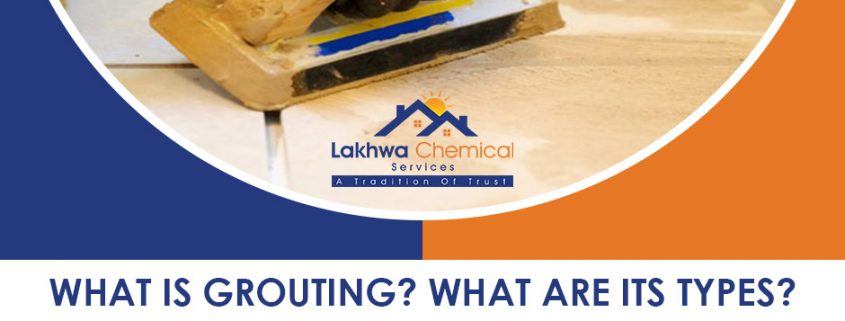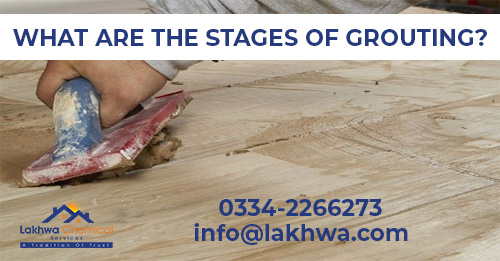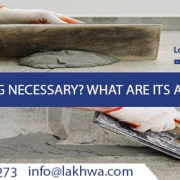What is Grouting? what its Types?
Grouting is a construction technique used to fill gaps or cavities in a structure with a fluid material called grout. Grout is typically composed of a mixture of water, cement, sand and aggregates. Grouting is commonly used in the construction industry to reinforce walls or floors, restrict water ingress, and stabilize soil.
How is Grout Applied?
Grout is used to fill the gaps between tiles or other surfaces to create a uniform texture. Following are some basic steps to apply grout:
- Prepare the surface by cleaning excess adhesive or debris from the surface.
- Mix the grout according to the manufacturer’s instructions to attain a smooth consistency.
- Use a rubber float or a grout spreader at a 45-degree angle to apply grout to the surface.
- Work in small sections, applying the grout to one section at a time.
- After applying the grout, wait a few minutes for it to set up slightly.
- Use a damp sponge or cloth to wipe away excess grout from the surface.
- Repeat the process, applying grout to the next section until the entire surface is covered.
- Allow the grout to dry.
- After the grout has dried, use a clean, dry cloth to buff away the residue from the surface.
Read More
Foundation Waterproofing Benefits: Overview
How Much Water Damage Repair Service Cost in Pakistan?
Is Water and Heat Proofing in Pakistan Reasonable for the Middle Class?
Types of Grout
Grout is a cement-based material used to fill the gaps between tiles and create a smooth, even surface. There are several types of grout available, each with its characteristics and applications.
Cement-based Grout
Cement-based grout is one of the most common types of grout available in sanded and unsanded versions. Sanded grout is recommended for wider gaps between tiles, while unsanded grout is ideal for narrow gaps. This grout type is made from sand, cement, and water.
Epoxy Grout
Epoxy grout is a two-part system that consists of a resin and hardener. Compared to cement-based grout, it has superior strength and durability, which makes it an ideal choice for high-traffic areas, heavy-duty applications, kitchens, and bathrooms.
Furan Grout
Furan grout is a chemical-resistant grout used in industrial settings such as chemical plants, food processing facilities, and laboratories. It is made from a combination of furfuryl alcohol and a curing agent, and is highly resistant to acids, alkalis, and solvents.
Read More
Heat Resistant Chemicals in Karachi: Properties and Characteristics
Advantages of Heat Proofing for a Warehouse in Karachi
Practical Usage of Heat Proofing Chemical Services
Urethane Grout
Urethane grout is known for its flexibility and ease of installation on horizontal and vertical surfaces. It is made from urethane resins, fillers, and pigments. Urethane grout is resistant to stains, making it a popular choice for high-traffic areas such as commercial kitchens and bathrooms.
Glass Grout
Glass grout is made from finely-grounded glass particles. It is available in different colors. Moreover, it is resistant to stains and mold. Glass grout is a reflective substance; it can create a unique visual effect when used with glass tiles.
What are the benefits of Grout?
Apart from filling gaps and spaces, grout is used in slab jacking, i.e., lifting distorted structures, load bearing, etc. It also helps in managing groundwater flow, noxious waste materials, and leakage. Grout comes in different shades and colors: Grey, beige, and brown are the most common ones used in kitchens and restrooms.
Conclusion
Grout is an essential product for filling crevices and gaps in different areas of a closed structure. There are several types of grout available: Cement-based grout is the most common type of grout used for tile installation. Epoxy grout is ideal for high-traffic areas and heavy-duty applications. Furan grout is resistant to chemicals and urethane grout is flexible and easy to install.
Grout is available in various colors and shades. Select the one that appeals to the surrounding and looks. If your tile spaces are developing a gap, call up Lakhwa Chemical Services today.






Leave a Reply
Want to join the discussion?Feel free to contribute!